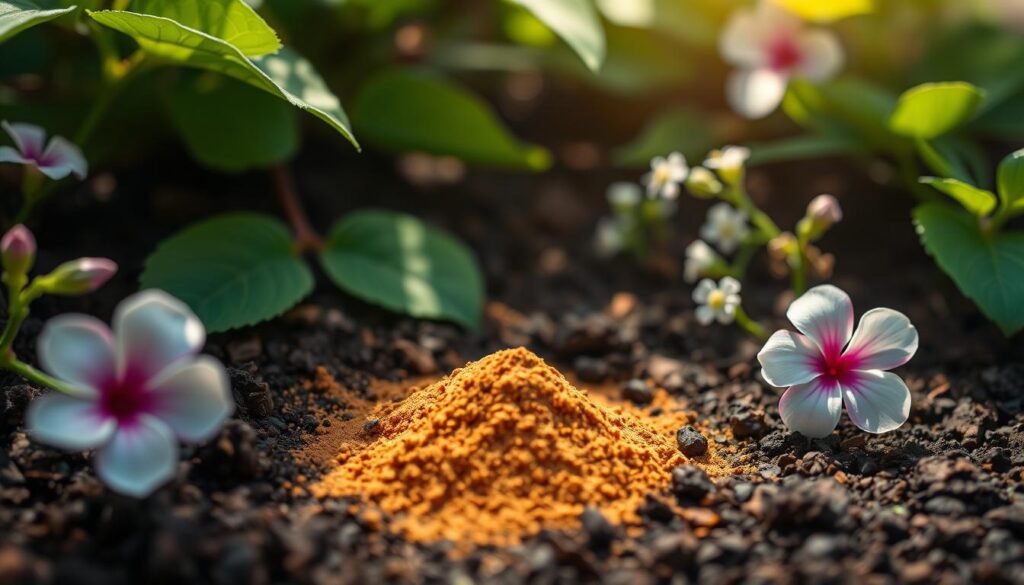Did you know that cinnamon from your kitchen can help your plants? It comes from the Cinnamomum verum tree. Cinnamon is great for gardeners and those who love indoor plants. It can make your plants healthier and more vibrant.
Cinnamon is a big help in organic gardening. It’s a safe choice instead of harsh chemicals. It can fight pests, stop fungal diseases, and help your cuttings grow. Learn how cinnamon can make your garden flourish.
Key Takeaways
- Cinnamon acts as a natural pesticide, deterring ants and other insects from your plants
- It possesses antifungal properties that can prevent and treat common plant diseases
- Cinnamon is an effective rooting agent, stimulating growth in plant cuttings
- The spice can be used to protect seedlings from damping-off disease and promote their development
- Cinnamon-based solutions can be sprayed on plants to control pests and fungal infections
Understanding Cinnamon as a Natural Plant Aid
Cinnamon is more than just a tasty spice. It comes from the bark of Cinnamomum verum trees. It’s great for your garden, helping plants stay healthy and grow well.
Origins and Properties of Cinnamon
Cinnamon comes from the bark of the Cinnamomum verum tree. It has special compounds like cinnamaldehyde, eugenol, and linalool. These help fight off fungi and pests, making cinnamon a good choice for organic gardening.
Chemical Composition and Active Ingredients
Cinnamon’s special mix of chemicals makes it useful in the garden. Cinnamaldehyde is key for fighting fungi and pests. Eugenol and linalool help keep pests away and help plants grow.
Natural vs. Commercial Solutions
Cinnamon is a natural choice for gardeners. It’s better for the environment than synthetic chemicals used in spice horticulture. It’s great for keeping pests away and making plants healthier.
| Cinnamon Benefits | Details |
|---|---|
| Antifungal Properties | Cinnamon can help prevent the growth of mold and mildew on plants. |
| Root Growth Stimulation | Cinnamon contains hormones that can stimulate and enhance root development. |
| Pest Repellent | Cinnamon’s insecticidal properties can deter ants, gnats, flies, and other garden pests. |
| Natural Fungicide | Cinnamon can be used to treat various plant diseases, including fungal infections. |
“Cinnamon is a safe and non-toxic alternative to chemical pesticides, fungicides, and fertilizers.”
Cinnamon is a great tool for gardeners. It helps plants grow strong and healthy. It’s good for cinnamon plant benefits, organic gardening, and spice horticulture. Using cinnamon makes gardening more sustainable and eco-friendly.
The Science Behind Cinnamon’s Effectiveness in Gardens
Cinnamon comes from the inner bark of certain Cinnamomum trees. It’s known for its antifungal properties and natural pest control. Studies show it works well against fungal diseases like grey mould and Phytophthora.
Cinnamon’s smell keeps pests like ants and fungus gnats away. It stops them from reproducing and keeps them from coming back. This makes cinnamon a great, eco-friendly solution for gardens and lawns.
It also fights damping-off disease in young plants and stops mould on soil. Using cinnamon helps make gardens healthier and more resistant to diseases. It’s a key tool for organic gardeners.
| Cinnamon’s Benefits | Supporting Evidence |
|---|---|
| Antifungal properties | Effective against grey mould and Phytophthora species |
| Natural pest control | Repels ants, fungus gnats, and other common garden pests |
| Damping-off disease prevention | Helps protect seedlings from this common fungal issue |
| Mould control | Reduces the presence of mould on substrate surfaces |
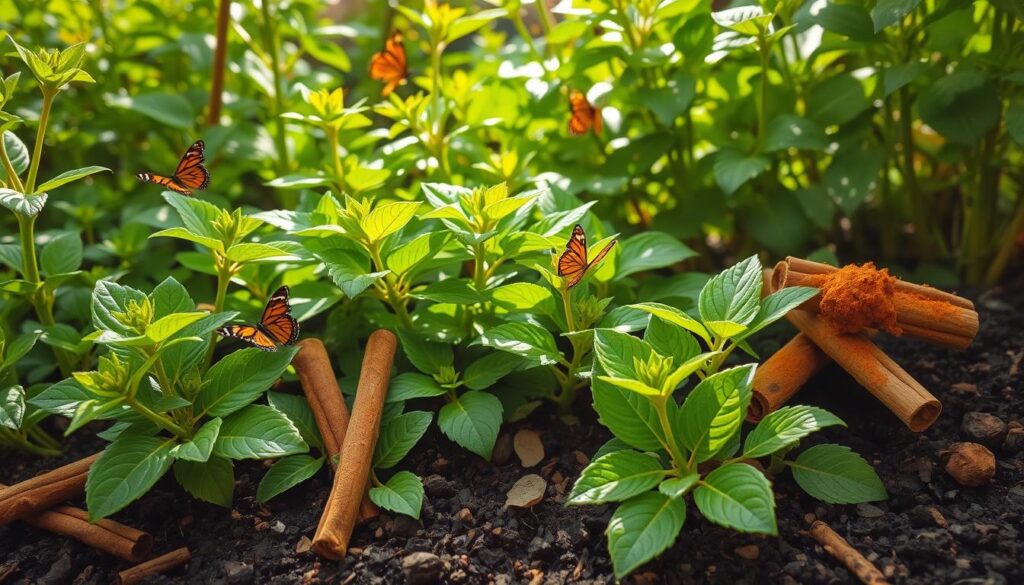
“Cinnamon’s versatility as a natural, eco-friendly solution makes it a must-have for any organic gardener.”
How to Sprinkle Cinnamon on Plants: Application Guide
Cinnamon is a great spice for your garden. It helps fight plant diseases, keeps pests away, and boosts root growth. Here’s how to use it right.
Proper Dosage and Timing
Using cinnamon on plants needs the right amount. Sprinkle a little on the soil or seedlings. For big plants, make a cinnamon spray by mixing 1 teaspoon of cinnamon in 5 liters of warm water. Use it when you see plant problems.
Application Methods for Different Plant Types
- For cuttings and propagation, dip the stem ends in cinnamon powder before planting. It helps with root growth and fights fungal diseases.
- When transplanting seedlings, mix a bit of cinnamon into the planting hole. It protects against damping-off and other diseases.
- Sprinkle cinnamon on the soil around mature plants. It keeps pests away, stops fungal growth, and boosts plant health.
- To fight fungal issues or pests, make a cinnamon spray. Steep the spice in warm water, then spray it on the leaves and stems of affected plants.
Safety Precautions During Application
While cinnamon is safe for plants, be careful. Don’t put it on tomato plants or garden cress leaves, as it might slow their growth. Also, watch the wind when sprinkling cinnamon. The powder can hurt your eyes and breathing if you inhale it.
By following these tips, you can use cinnamon in your organic gardening and see its benefits. Sprinkle cinnamon on plants, companion planting, and enjoy organic gardening success.
Cinnamon as a Natural Antifungal Treatment
Cinnamon, from the bark of Cinnamomum trees, is now known for its antifungal powers. It’s a natural choice instead of chemical fungicides. This helps plants grow better and lowers the chance of fungal infections.
The secret to cinnamon’s power is its chemicals. Cinnamaldehyde, eugenol, and camphor in the bark and oils fight microbes well. These ingredients stop many fungal diseases from growing.
Cinnamon is great for fixing many plant problems. It stops damping-off in young plants, fights grey mould, and blocks Phytophthora diseases. Gardeners can use cinnamon powder on the soil or make a spray to protect plants from fungi.
| Antifungal Properties of Cinnamon | Effectiveness |
|---|---|
| Damping-off in seedlings | Effective |
| Grey mould control | Effective |
| Inhibition of Phytophthora species | Effective |
Cinnamon is a strong antifungal agent for organic gardeners. It helps keep plants healthy without harsh chemicals. This natural method supports a sustainable, antifungal properties way to care for plants.
“Cinnamon powder has been shown to have antifungal properties that can be beneficial for plants.”
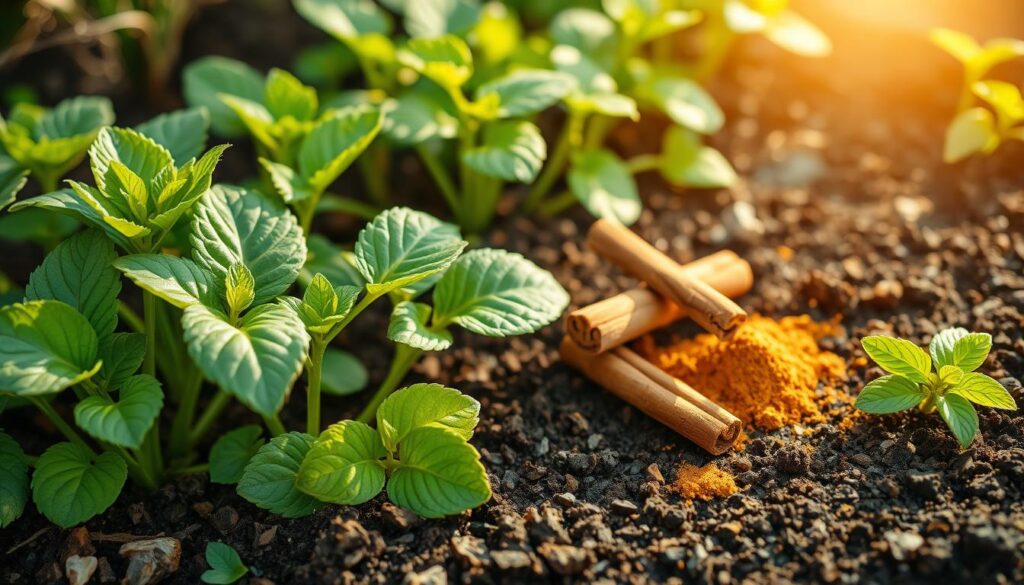
Fighting Plant Diseases with Cinnamon Solutions
Cinnamon is a powerful ally against common plant diseases. It has strong antifungal properties. This makes it great for fighting off damping-off, grey mould, and other fungal infections. By using cinnamon plant, gardeners can manage diseases naturally. This keeps their plants healthy and strong.
Common Plant Diseases Treatable with Cinnamon
Cinnamon is a versatile tool for gardeners. It’s effective against several diseases, including:
- Damping-off: A fungal disease that affects seedlings, causing them to wilt and collapse.
- Grey mould: Also known as Botrytis, this fungus can infect a wide range of plants, leading to rotting and discoloration.
- Fungal leaf spots: Various fungal infections that manifest as discolored or necrotic spots on foliage.
Prevention vs Treatment Approaches
Cinnamon can be used to prevent and treat plant diseases. For prevention, sprinkle a light dusting of ground cinnamon on the soil or seedlings. This creates a barrier that stops harmful fungi.
For treatment, make a cinnamon spray to apply to affected areas. The antifungal properties of cinnamon help control and prevent the spread of infections. This makes it a valuable tool for organic gardening enthusiasts.
Using cinnamon as a natural pest control solution helps gardeners keep their plants healthy. It’s a must-have for any natural gardening toolkit due to its effectiveness against common diseases.
Natural Pest Control Using Cinnamon
Cinnamon is more than just a spice in your kitchen. It’s a powerful natural pest deterrent for your garden. Its strong scent keeps ants and fungus gnats away.
The smell of cinnamon messes with the life cycle of pests. Sprinkle cinnamon powder around plants to stop ants. For fungus gnats, dust a little cinnamon on potted soil.
Using cinnamon is a safe, organic way to fight pests. It protects your plants and keeps the garden healthy. Cinnamon’s uses go beyond pest control, making it essential for any natural gardening toolkit.
“Cinnamon is one of the best natural pest deterrents around, and it’s accessible right in your own kitchen.”
Adding cinnamon to your organic gardening routine helps keep pests away. It works for both outdoor and indoor plants. With cinnamon, you can have a pest-free garden without harming your plants or the environment.
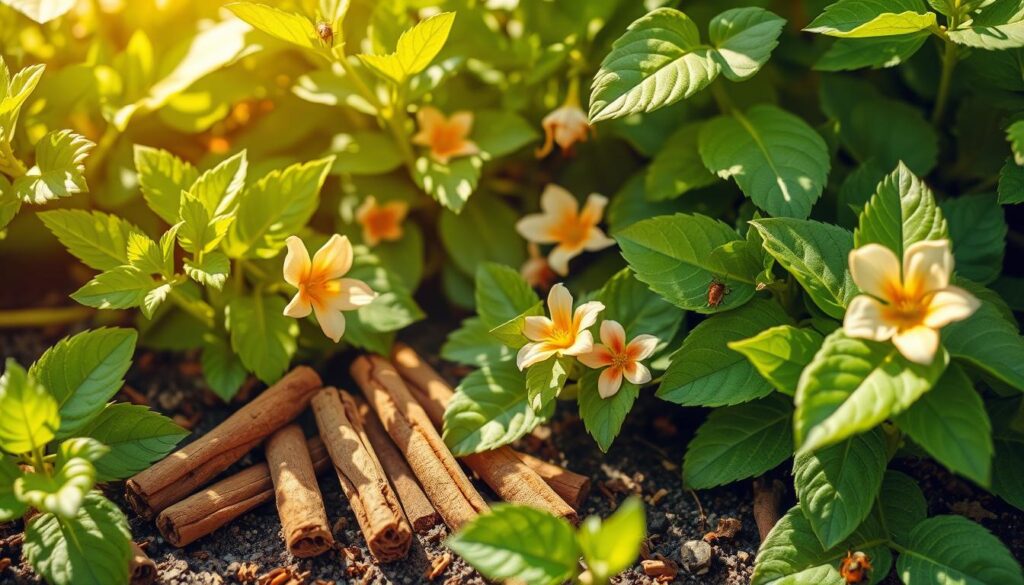
Promoting Root Growth with Cinnamon
Cinnamon is more than just a spice with a warm, fragrant aroma. It’s also a powerful tool for gardeners. It helps plants grow strong roots, making it great for organic gardening.
Propagation Techniques
When you’re growing plants from cuttings, cinnamon is key. Just dip the cut ends in cinnamon powder before planting. It fights off fungal infections and boosts root growth.
Cinnamon acts like a natural rooting hormone. This makes it a green choice for gardeners who want to grow plants sustainably.
Root Development Enhancement
Cinnamon also helps existing plants grow stronger roots. Sprinkle a little cinnamon around the base of your plants. It makes them absorb nutrients and water better.
This leads to healthier, more resilient plants. They can handle environmental challenges better and grow well in your garden.
Cinnamon is a valuable tool for organic gardeners. It helps plants grow strong and healthy. This is thanks to the cinnamon plant benefits of using it in organic gardening.
“Cinnamon is a natural wonder that can work wonders in the garden, promoting healthy root growth and supporting [companion planting] practices.”
Cinnamon as a Seedling Protector
In organic gardening, sprinkle cinnamon on plants is a powerful way to protect seedlings. Cinnamon fights off damping-off disease and other fungi that harm young plants.
Cinnamon’s antifungal properties are key. A thin layer of cinnamon powder around seedlings stops fungi from growing. This stops damping-off disease, which can kill seedlings fast.
Cinnamon does more than just fight fungi. It also helps seedlings grow strong and healthy. Using cinnamon in your garden means your plants will grow better and faster.
“Cinnamon is a game-changer in the world of organic gardening. Its natural antifungal properties make it an indispensable tool for protecting delicate seedlings and ensuring their healthy growth from the very beginning.”
- Sprinkle a thin layer of cinnamon powder around the base of newly germinated seedlings.
- Create a protective barrier that inhibits the growth of soil-borne fungi and prevents damping-off disease.
- Enjoy increased seedling survival rates and stronger, healthier plant growth from the earliest stages.
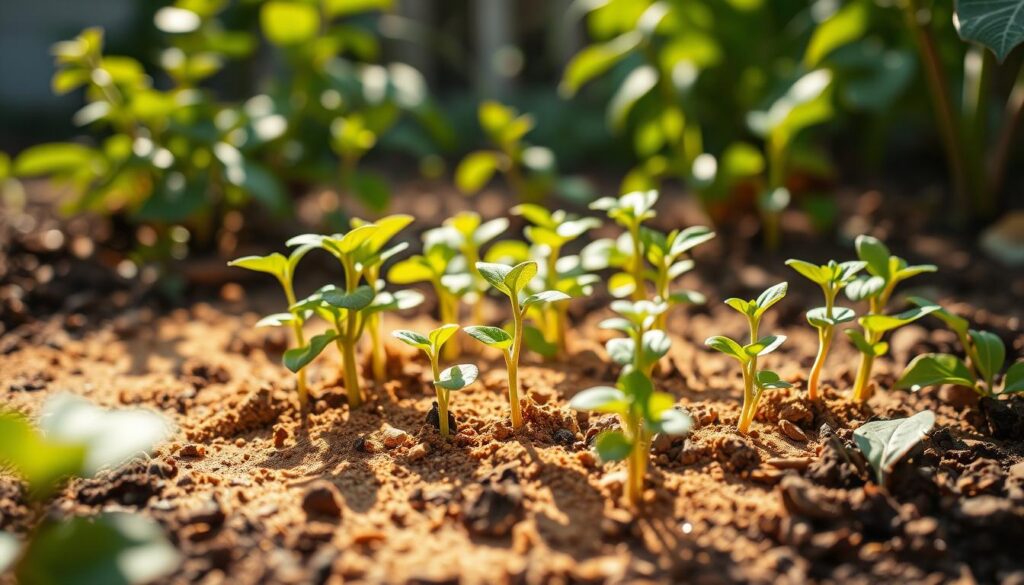
Adding this spice horticulture trick to your gardening can make a big difference. It helps your organic garden grow strong and healthy from the start.
Making and Using Cinnamon Spray for Plants
Cinnamon is a powerful tool for organic gardening. It has a strong smell and fights off fungi naturally. Making a homemade cinnamon spray can help protect your plants from diseases and pests.
Recipe and Preparation Steps
To make cinnamon spray, you need a few things:
- 2-3 tablespoons of ground cinnamon powder
- 1-2 quarts of warm water
- A clean spray bottle
Mix the cinnamon powder with warm water in a container. Stir well and let it sit overnight. In the morning, strain it through a coffee filter to get rid of solids. Then, pour the liquid into your spray bottle.
Application Guidelines
To use the spray, spray it on your plants’ leaves and stems. Do this twice a week to prevent or treat diseases and pests. Cinnamon’s smell keeps many pests away, like ants and slugs.
Cinnamon also fights off plant diseases like mildew and mold. Regularly spraying your plants with this solution keeps them healthy. It’s a great way to avoid using harsh chemicals in your garden.
Use organic cinnamon for the best results. Watch how your plants react to the spray. With a little trial and error, you can use cinnamon to improve your organic gardening and natural pest control efforts.
Soil Amendment Benefits of Cinnamon
Gardeners looking to improve their organic gardening should think about cinnamon. This spice comes from certain tree barks. It has many benefits for garden soil and plant health.
Cinnamon is great at fighting fungi. Sprinkling cinnamon on the soil or mixing it in can stop harmful fungi. This includes damping-off in seedlings. It also keeps pests away, making the soil less welcoming to them.
Cinnamon also helps plants grow new roots. It’s used as a rooting hormone for cuttings, a cheaper and organic choice. It’s especially good for plants with small roots, like aloe.
Adding cinnamon to the soil has many benefits. It fights fungal infections, keeps pests away, and helps roots grow strong. Cinnamon is a key tool for organic gardeners.
“Cinnamon has been used in gardens for an extended period, possibly spanning several generations, and its benefits have been recognized for centuries.”
By sprinkling cinnamon on the soil or adding it to compost, gardeners can make their gardens better. They’ll have a healthy, pest-free, and disease-resistant garden.
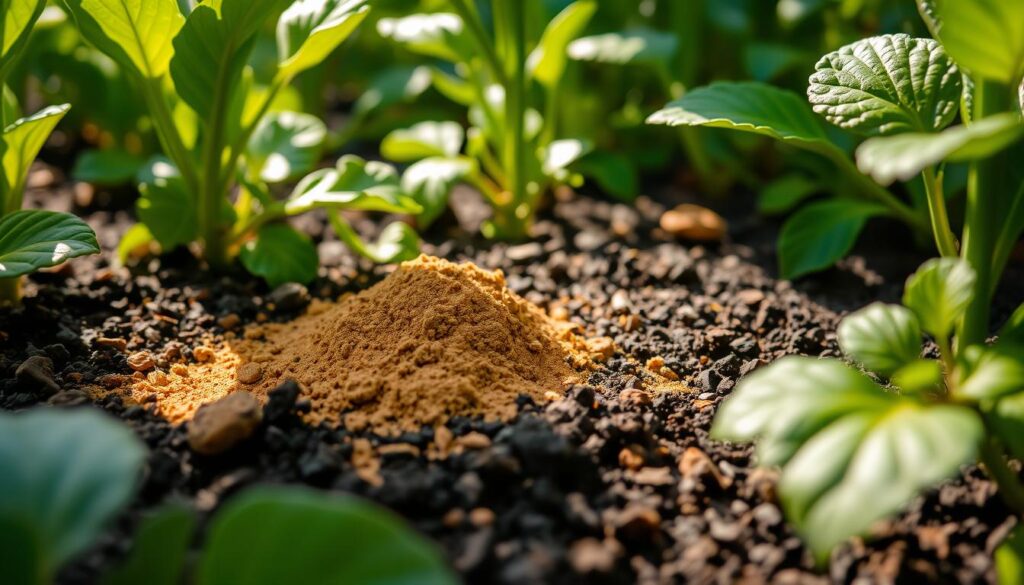
Using Cinnamon for Indoor Plant Care
Cinnamon is more than just a tasty spice. It’s also a natural helper for our indoor plants. This ingredient brings many benefits to keep our houseplants healthy and strong.
Cinnamon is great at fighting off pests. It keeps fungus gnats away with its strong scent and texture. Just sprinkle some cinnamon powder on your plants’ soil to keep these pests at bay.
Cinnamon is also a natural antifungal agent. The compound eugenol in cinnamon stops fungal growth. Use a cinnamon spray on your plants’ leaves and stems to prevent diseases.
Cinnamon helps plants grow too. It boosts root development, making plants stronger and healthier. It’s good for both new and old plants.
Make a cinnamon spray to use on your plants. Boil cinnamon sticks in water, then mix it in a spray bottle. This solution fights pests and diseases while feeding your plants.
Using cinnamon in your plant care routine is smart. It keeps your garden healthy without harsh chemicals. Let cinnamon help your indoor garden grow strong and vibrant.
“Cinnamon is a versatile and natural solution for keeping your indoor plants healthy and vibrant.”
Best Practices for Garden-Wide Cinnamon Application
Seasonal Application Tips
Apply cinnamon treatments seasonally, especially in spring and fall. These times are key for protecting your garden from fungal diseases. By doing this, you can keep your garden healthy and vibrant.
Integration with Other Natural Methods
Use cinnamon with other organic gardening methods like companion planting and crop rotation. Mixing cinnamon with natural solutions like neem oil or diatomaceous earth helps control pests and diseases. This approach reduces the need for harmful chemicals.
Following these tips, you can use cinnamon to make your garden flourish. It’s great for fighting fungal infections, keeping pests away, and boosting root growth. Cinnamon is a valuable tool for any gardener looking to grow organically.
